
Figure : Long distance power transmissions The large-scale transmission and distribution of electrical energy over long distances is done with the use of transformers. The voltage output of the generator is stepped-up. It is then transmitted over long distances to an area sub station near the consumers. There the voltage is stepped down. It is further stepped down at distributing sub-stations and utility poles before a power supply of 240 V reaches our homes.
A power transmission line feeds input power. at 2300 V to a step down transformer with its primary windings having 4000 turns. The number of turns in the secondary in order to get output power at 230 V are :
4
40
400
4000
The correct Answer is:C
Given ε0=2300V
NP=4000
εs=230V
Since NPNs=εpεs
∴NS=Npεεεs=4000×2302300
=400
Topper's Solved these Questions
- BOOK - EDUCART PUBLICATIONCHAPTER - CBSE TERM-1 SAMPLE PAPER 1EXERCISE - SECTION-B24videos
CBSE TERM-1 SAMPLE PAPER 1
- BOOK - EDUCART PUBLICATIONCHAPTER - SAMPLE PAPER SELF-ASSESSMENT (11)EXERCISE - SECTION -C1videos
SAMPLE PAPER SELF-ASSESSMENT (11)
- BOOK - EDUCART PUBLICATIONCHAPTER - SAMPLE PAPER - 8EXERCISE - Section C6videos
SAMPLE PAPER - 8
Similar Questions
Case study :
Read the following paragraph and answers the questions :
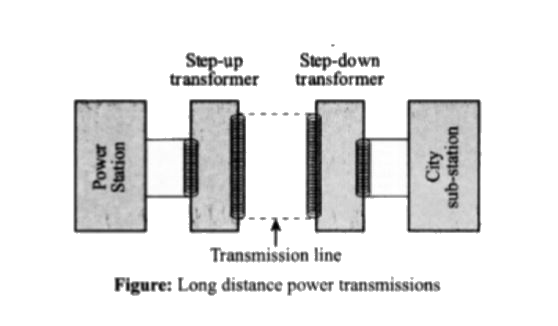
The large-scale transmission and distribution of electrical energy over long distances is done with the use of transformers. The voltage output of the generator is stepped-up. It is then transmitted over long distances to an area sub-station near the consumers. There the voltage is stepped down. It is further stepped down at distributing sub-stations and utility poles before a power supply of 240 V reaches our homes.
A power transmission line feeds input power at 2300 V to a step down transformer with its primary windings having 4000 turns. The number of turns in the secondary in order to get output power at 230 V areView SolutionLong Distance Power Transmission
View Solution
Knowledge Check
- Question 1 - Select One

Figure : Long distance power transmissions The large-scale transmission and distribution of electrical energy over long distances is done with the use of transformers. The voltage output of the generator is stepped-up. It is then transmitted over long distances to an area sub station near the consumers. There the voltage is stepped down. It is further stepped down at distributing sub-stations and utility poles before a power supply of 240 V reaches our homes.
Which of the following statement is true?AEnergy is created when a transformer steps up the voltageBA transformer is designed to convert an AC voltage to DC voltageCStep-up transformer increases the power for transmissionDtep-down transformer decreases the AC voltage - Question 2 - Select One

Figure : Long distance power transmissions The large-scale transmission and distribution of electrical energy over long distances is done with the use of transformers. The voltage output of the generator is stepped-up. It is then transmitted over long distances to an area sub station near the consumers. There the voltage is stepped down. It is further stepped down at distributing sub-stations and utility poles before a power supply of 240 V reaches our homes.
We need to step-up the voltage for power. transmission, so that:AThe currentis reduced and consequently, the I2R loss is cut downBThe voltage is increased, the power losses are also increasedCThe power is increased before transmission is doneDThe voltage is decreased so V2R losses.are reduced - Question 3 - Select One
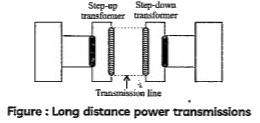
Figure : Long distance power transmissions The large-scale transmission and distribution of electrical energy over long distances is done with the use of transformers. The voltage output of the generator is stepped-up. It is then transmitted over long distances to an area sub station near the consumers. There the voltage is stepped down. It is further stepped down at distributing sub-stations and utility poles before a power supply of 240 V reaches our homes.
If the secondary coil has a greater number of turns than the primary,AThe voltage is stepped-up (Vs>Vp) and arrangement is called a step-up transformerBthe voltage is stepped-down (Vs<Vp) and arrangement is called a step down transformerCthe voltage is stepped-down (Is>Ip) and arrangement is called a step down transformerDthe voltage is stepped-down (Is<Ip) and arrangement is called a step down transformer
Case study :
Read the following paragraph and answers the questions :
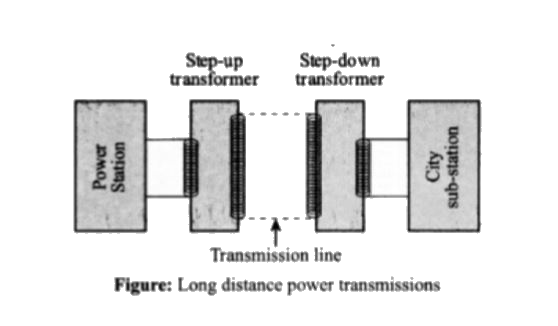
The large-scale transmission and distribution of electrical energy over long distances is done with the use of transformers. The voltage output of the generator is stepped-up. It is then transmitted over long distances to an area sub-station near the consumers. There the voltage is stepped down. It is further stepped down at distributing sub-stations and utility poles before a power supply of 240 V reaches our homes.
Which of the following statement is true?View SolutionCase study :
Read the following paragraph and answers the questions :
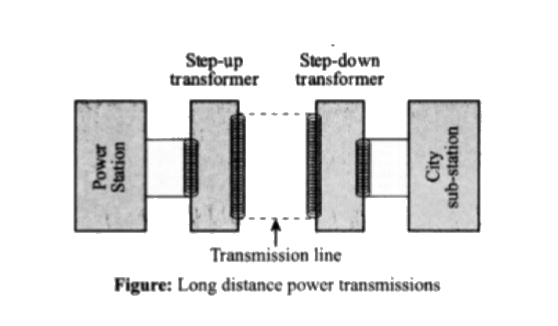
The large-scale transmission and distribution of electrical energy over long distances is done with the use of transformers. The voltage output of the generator is stepped-up. It is then transmitted over long distances to an area sub-station near the consumers. There the voltage is stepped down. It is further stepped down at distributing sub-stations and utility poles before a power supply of 240 V reaches our homes.
If the secondary coil has a greater number of turns than the primary,View SolutionCase study :
Read the following paragraph and answers the questions :
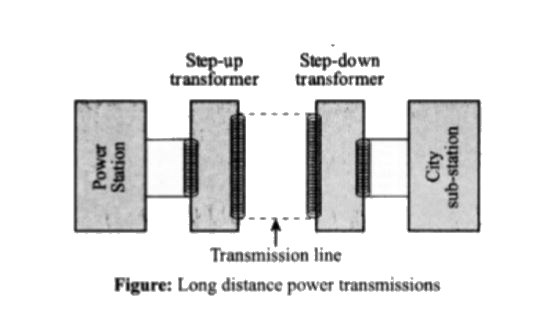
The large-scale transmission and distribution of electrical energy over long distances is done with the use of transformers. The voltage output of the generator is stepped-up. It is then transmitted over long distances to an area sub-station near the consumers. There the voltage is stepped down. It is further stepped down at distributing sub-stations and utility poles before a power supply of 240 V reaches our homes.
We need to step-up the voltage for power transmission, so thatView SolutionA power transmission line feeds input power at 2400 V to a step down transformer with its primary windings having 4000 turns. What should be the number of turns in the secondary windings in order to get output power at 240 V?
View SolutionState the underlying principle of a transformer. How is the large scale transmission of electric energy over long distances done with the use of transformers ?
View Solution

